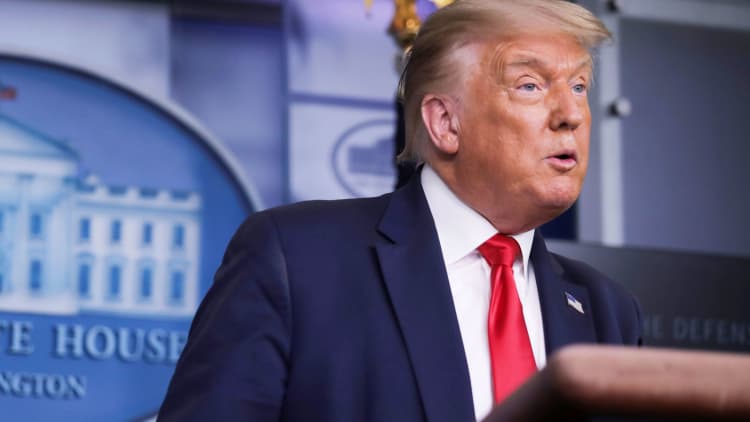
President Donald Trump said Tuesday he still thinks hydroxychloroquine works against Covid-19, despite mounting evidence that the malaria drug is ineffective in treating the virus.
Trump was asked by a reporter about a video Trump shared on Twitter that went viral across social media platforms that claimed hydroxychloroquine is "a cure for Covid" and "you don't need a mask" to slow the spread of coronavirus. The video was later labeled as containing misleading information and has since been taken down.
"I wasn't making claims," Trump said of his tweet, noting that he was passing along recommendations from other people, including doctors.
"Many doctors think it is extremely successful, the hydroxychloroquine coupled with the zinc and perhaps the azithromycin," he said. "Many doctors think it's extremely good, and some people don't."
He acknowledged that support for the drug has become political, largely because he's touted it in the past.
"I happen to believe in it. I would take it. As you know, I took it for a 14-day period. And as you know, I'm here. I happen to think it works in the early stages," he said.
Trump insisted the drug was safe, saying he had "no problems."
"It's safe, it doesn't cause problems," he said. "I had no problems, I had absolutely no problems. I felt no different. I didn't feel good, bad or indifferent ... and I tested, as you know, it didn't get me."
There are no FDA-approved drugs for the coronavirus, which has infected more than 16 million people worldwide and killed at least 655,300, according to data compiled by Johns Hopkins University. Antiviral drug Remdesivir has an emergency use authorization from the FDA, but it's not the same as a formal approval.
In addition to treating malaria, hydroxychloroquine is often used by doctors to treat rheumatoid arthritis and lupus. It is known to have serious side effects, including muscle weakness and heart arrhythmia.
The drug generated excitement earlier in the year after a handful of small studies suggested it could be beneficial, especially when combined with antibiotic azithromycin. Trump promoted it as a potential treatment for the virus and said he used it as a preventive measure against the disease. However, several larger studies showed the drug was not helpful and caused heart issues in some patients.
For example, a study published in the New England Journal of Medicine found hydroxychloroquine was no better than a placebo in preventing coronavirus infections. The study, the first randomized, placebo-controlled trial, considered the "gold standard" in science, looked at 821 people in the U.S. and Canada who had been exposed to the coronavirus.
Another study, funded by the National Institutes of Health, found hospitalized patients who received the drug within 48 hours were, on average, more lito be more severely ill than those who didn't receive the drug.
Last month, the Food and Drug Administration pulled the drug's authorization for emergency use after determining it was "unlikely" to be effective in treating people with Covid-19. Days later, the World Health Organization announced it was dropping the drug from its global study looking at potential treatments for the coronavirus after data from the trial suggested it would not be beneficial.
Dr. Anthony Fauci, the nation's leading infectious disease expert, was asked about the drug earlier in the day.
He said, "The overwhelming prevailing clinical trials that have looked at the efficacy of hydroxychloroquine have indicated that it is not effective in coronavirus disease."


